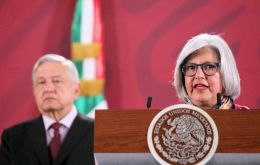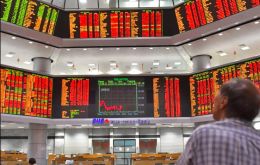MercoPress. South Atlantic News Agency
Tag: Brazilian economy
-
Tuesday, January 19th 2021 - 08:29 UTC
Brazilian economy forecasted to grow 3,45% this year with 3,75% inflation

Brazilian financial and market analysts upgraded their economic growth forecast for 2021, from 3.41% to 3.45%, and maintained the projection at 2.5% for 2022, the Central Bank of Brazil announced Monday.
-
Wednesday, September 2nd 2020 - 09:45 UTC
Brazilian economy is back to 2009 size, following a 11,4% contraction in the second quarter

Brazil’s economy shrank in the second quarter by the most on record as anti-coronavirus lockdown measures slammed activity in almost every sector, dragging Latin America’s largest economy back to the size it was in 2009.
-
Tuesday, September 1st 2020 - 08:56 UTC
Brazilian finances deteriorating: seven months primary deficit 11,9% of GDP

Brazil's finances continued to deteriorate in July as the COVID-19 crisis pushed the public sector debt and deficit as a share of the economy to new records, official figures showed on Monday, although not as bad as economists had feared.
-
Tuesday, March 17th 2020 - 08:15 UTC
Brazil US$ 30bn fiscal boost to prop the economy and soften Covid-19 impact

Brazil’s government on Monday announced emergency measures to inject nearly 150 billion reais (US$ 30 billion) into the economy to soften the blow from the coronavirus pandemic.
-
Tuesday, February 4th 2020 - 07:15 UTC
Mexico targeting the “very closed” Brazilian economy expects to negotiate a trade deal

Mexico is negotiating with Brazil to expand economic cooperation and believes it can find areas of mutual benefit even though the Brazilian economy is “very closed,” Economy Minister Graciela Marquez said on Friday.
-
Wednesday, October 16th 2019 - 17:40 UTC
Brazilian economy still on the takeoff tarmac, lack of confidence blamed

Brazil's economy is on an erratic path, according to economic activity data released for the third quarter of 2019. The economy shows no signs of a consistent recovery, and economic activity still depends on household consumption, trade, and the service sector.
-
Friday, May 17th 2019 - 09:24 UTC
Fitch rating agency says uncertainty overflying the Brazilian economy

Brazil’s push to overhaul its costly social security system is a welcome step toward healing public finances and the economy, but is not enough to stabilize public debt or trigger a positive review on the country’s credit rating, directors at rating agency Fitch said on Thursday.
-
Thursday, May 9th 2019 - 08:26 UTC
Brazil's economy on an extremely slow start in the second quarter

Brazil's economy got off to an extremely slow start in the second quarter, figures released showed, with activity in the all-important services sector contracting in April for the first time since September last year.
-
Monday, May 6th 2019 - 09:39 UTC
Brazil trade surplus in April, the second largest ever recorded for the month

Brazil posted a trade surplus of US$ 6.06 billion in April, the Economy Ministry said, which is wider than the previous month. It was the second largest surplus ever recorded for the month of April and the biggest monthly surplus so far this year, a result of exports totaling US$ 19.69 billion and imports of US$ 13.63 billion.
-
Tuesday, April 30th 2019 - 09:58 UTC
Brazil's central government finances tend to improve

Brazil’s central government’s primary budget deficit narrowed in March thanks to aggressive cuts in discretionary spending, the Treasury said on Monday, although it warned that public finances were still at risk from pension commitments and weak revenues.
